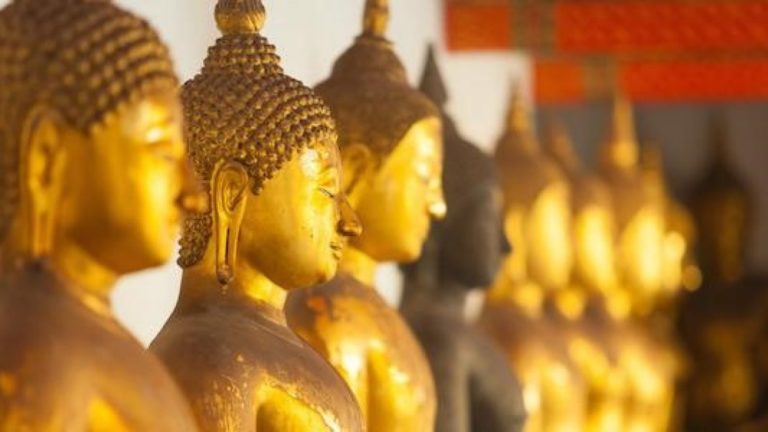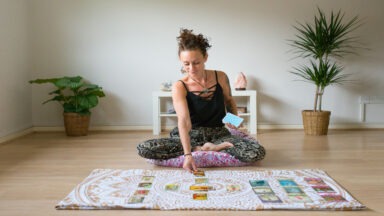How to Use the 10 Paramitas (Perfections) as Daily Mantra Throughout the Holiday Season

The ten paramitas can be traced back to early Buddhist scripture. “Perfection” of these qualities–both in meditation and in daily life–can strengthen inner character and precipitate spiritual awakening. The paramitas seem particularly relevant as we head into the holidays. Why not use them as simple mantras to keep yourself centered, buoyant and joyful as you navigate through the coming season?
The paramitas flow naturally from the first one to the last, entwining and enhancing each other’s aspects as they go along. You can start your daily affirmations with the first virtue, generosity, sometime just before Thanksgiving. Say the mantra–out loud or to yourself–throughout the day, especially when you are feeling challenged or overwhelmed. Focus intently on what it means to be generous; make it a priority, your daily goal. Contemplate generosity. Read about it. Practice it. Be it. Stay with the mantra of generosity for three days, then move on to the second perfection, morality. In 30 days, by around Christmas or New Years, you will have worked your way through all ten paramitas – no small feat!
- GENEROSITY
“Today I will practice generosity with my words and deeds.”
Generosity is the perfect mantra for the holidays. Sometimes we are asked to give so much from November to January– time, gifts, service, advice, comfort, charity– how can we extend to others tirelessly and with a pure motivation? Practice giving free from attachment to the gift or expectation of personal reward. When you volunteer some hours at the elementary school, enjoy your time with the children instead of worrying about your “to do” list. Really be there – drink in those bright eyes and playful smiles as you help with reading or spelling. It sounds corny, but it’s true: the more selflessly you give to others the less possessive you become, and the more happy you will be. Try it! Just repeating the words of the mantra out loud in the morning might lighten the burden of the busy day ahead. You might even look forward to it!
- MORALITY
“Today I will be virtuous in action and follow my moral compass.”
After spending a few days becoming familiar with gracious giving, you are ready to move on to fine-tuning your behavior and conduct. This paramita is not about judgements of “good” and “bad” from an outside source; it’s not tied to specific religious, familial, or societal expectations. Take these three days to locate your internal gauge of proper conduct – what does it means to you to “do the right thing?” Over the holidays we get so busy we often get mindless; rolling through that pesky stop sign when you’re late for school, missing the Thanksgiving food drive, ignoring a coworker because of a minor disagreement. This mantra will help you infuse your actions with a measure of mindfulness. Ethical people aren’t stiff or preachy, they are natural and pure, unmarred by aggressive, greedy, jealous, codependent motivation. Pay attention to your words and deeds over holidays. See if you can locate your own personal moral compass.
- RENUNCIATION
“Today I will be content with whatever arises.”
Now that you’re more in tune with your barometer of “right” and “wrong”, you might notice how hard it is to free yourself from impure intention. This affirmation can help. We often confuse what binds us with what can free us. Sometimes it’s just never enough; we always want something more, different, newer, better: If only I had lost those extra five pounds I would look good in this cocktail dress! If I had saved a bit more money I could have gotten my spouse a better gift! How can I pickup my in laws at the airport in this ratty old car? Why did my friend get to remodel her entire kitchen for the holidays? Renunciation is not a bad word – it just means accepting situations as they are and letting things be. When you free yourself from the endless cycle of craving and grasping, you suddenly see (and appreciate!) what’s right there in front of you: I look good in this cocktail dress! My partner loves the gift! My old car cleans up so nicely! My kitchen sure makes a cozy space for holiday baking! Happiness never comes from what we lack; contentment comes from appreciating what we have.
- INSIGHT
“Today I will notice and better understand the world around me.”
Aren’t things a bit more relaxed now that you are less dissatisfied? The next step is taking a look “behind the scenes” at how the world works. How do my actions precipitate consequences? Life is so ephemeral – what does it all mean? Why is there so much suffering? The wisdom paramita encourages us explore these questions without trying to change or manipulate the answers. Instead of deciding that the holiday gathering is “no fun” because the “food is terrible” and “none of your friends are there,” investigate these feelings. Why aren’t you enjoying yourself? Isn’t the fruit plate refreshing if you take the time to chew more slowly? The quiet person in the corner is actually quite interesting now that you are talking. Use the wisdom paramita to penetrate confusing, disheartening thoughts. Lighten up with a little insight – let the holidays sparkle.
- DILIGENCE
“Today I will rouse energy to move forward on my spiritual path.”
It’s a real relief– a burden lifted– to glimpse the sacred, fragile beauty all around us. But then we slip back into our old habits – get short-tempered, skip our self-care, act out of impulse. Focus on the mantra of diligence for a few days instead of numbing out. Rouse internal strength and the courage to not back down from your insights. Keep on the path of spiritual growth. When things seem mundane or tiresome, come back to your intention. Restore your energy and renew your commitment by taking time out for meditation, contemplation, yoga, or a short walk in nature. You will be refreshed and ready for anything
- sledding with the kids, visiting a sick neighbor, or cooking a family feast.
- FORBEARANCE
“Today I will be patient and tolerant when facing life’s challenges.”
Maybe it’s all clarity and serenity on your yoga mat or meditation cushion, but what happens when you get back out into the world? The dog is barking. The apple pie is burning. The kids are coughing. Your zipper just broke. Try a little patience! For these three days, accept that suffering and inconvenience are natural parts of life’s ebb and flow. Understand a tough challenge can ultimately provide a great lesson. When you don’t get so angry and blame all your suffering on outer circumstances, you are able to accept responsibility for your own intolerance to particular situations. Maybe the dog is barking because the cat is on the counter. The pie crust might be a little over-browned, but you took it out just in time. The kids just need a hot drink after the snowball fight. You love that skirt and wear it all the time – no wonder the zipper broke! Let your peace of mind come from within; bring your meditation off the cushion and into your life.
- TRUTHFULNESS
“Today I will have honest communication with myself and others.”
Now that you have raised the bar on your tolerance, it’s time to get real – open and honest. This paramita is not about “faking” it. Many of us drift through the holidays wearing a mask – spouting a pleasantry here, forcing a smile over there. Start by being honest with yourself. On the first day, look into your “mental mirror” and contemplate your motivations, fears, hopes and dreams. Get comfortable with what you see. Then slowly extend your honesty outward. This paramita encourages a type of truthfulness free from pre-concepts or judgments. At first it might be uncomfortable to speak up when required or hold your tongue if needed. Practice with yourself, family members and close friends, then in the greater community. Try it for three days; your conscience will clear and you’ll probably sleep more soundly at night.
- DETERMINATION
“Today I will overcome obstacles hindering my spiritual growth.”
After 21 days of the paramitas, you should feel pretty good inside. You are learning to let life unfold without picking it apart, wishing things were different, or trying to control every minor detail. What’s getting in the way of your spiritual growth? It’s time to resolve to evolve! Need a meditation cushion? Buy one for the holidays. Crunched for space? Designate a special place in the house for your yoga mat and supplies. We all have the seeds inside of us to be happy and fulfilled – what’s holding you back? Use the mantra of determination to forge ahead. Don’t let small, insignificant obstacles block your path to peace of mind.
- LOVING-KINDNESS
“Today I will cultivate empathetic, caring feelings for myself and others.”
You’re moving forward; making time for meditation, contemplation, or visualization, feeling more refreshed and wakeful, and putting the paramitas into practice throughout the day. A sudden burst of tears in savasana; the urge to hug a pregnant stranger at the shopping mall; a lump in your throat remembering last Thanksgiving’s disagreement with your cousin; tender-hearted feelings when you cross paths with a hatless teenager shivering in the wind – what’s going on? The paramitas are working! You wish people happiness and freedom from suffering. At first the focus might be on yourself and those closest to you but as you repeat the mantra of loving-kindness, let those positive intentions radiate outward. The cultivation of compassionate thoughts should fuel you, not drain you, swelling your holiday spirit and letting good cheer abound.
- EQUANIMITY
“Today I will embrace all of life’s ups and downs.”
Serenity. Impartiality. The tenth paramita represents the culmination of your month-long series of contemplations. What’s the secret to inner steadiness in the face of all the ups and downs, the positives and negatives? The answer is equanimity. Say the mantra throughout your day. Let your senses tingle– smell the cinnamon, taste the cocoa, hear the holiday music, touch the pine cones, see those twinkling lights–allow yourself to steep in the joy of simply being alive. Let the practice of equanimity keep you even-keeled when things get busy or out of your control. Really appreciate all the holiday season has to offer. Feel good inside and radiate that goodness all around with mantra–infuse your holidays with a daily dose of the ten Perfections.
Chögyam Trungpa: Poetry, Crazy Wisdom, and Radical Shambhala

I was entranced with the beautiful writings of Chögyam Trungpa for many years. His book, Shambhala: The Sacred Path of The Warrior became a staple in my life. It opened my eyes to the spiritual potential and deepened my understanding of life, love, and the divine.
The more I learned, the more I craved Chögyam Trungpa’s books. When I meditated on him, I could feel his playful and loving heart. He had died a few months prior to my first experience of his unique spirit and work.
My favorite Chögyam Trungpa quotes are, “Everyone loves something, even if it’s only tortillas,” and “The ideal of warriorship is that the warrior should be sad and tender, and because of that, the warrior can be very brave as well.”
A prolific writer and Buddhist meditation master, Chögyam Trungpa (March 5, 1939 – April 4, 1987) is among the first masters who brought Buddhist teachings to the west and made them accessible.
The holder of the Kagyu and Nyingma lineages, Chögyam Trungpa was a brilliant man who lived a remarkable life.
Besides being the 11th Trungpa Tülku, an incarnating line of Tibetan lamas, Chögyam was:
- A radical, groundbreaking teacher in the Vajrayana school of Buddhism
- A re-imaginer of the original visions of Shambhala (a mythic Buddhist kingdom)
- A Tertön, someone who discovers ancient, hidden, Tibetan Buddhist texts
- The Supreme Abbot of the Surgmang Monasteries
- Globally adored Poet, Artist, and Scholar
“Enlightenment is ego’s ultimate disappointment.”
― Chögyam Trungpa
The Adventurous Life of Chögyam Trungpa
While studying meditation, philosophy, calligraphy, painting, and monastic dance, Chögyam Trungpa became a monk in 1947.
In the 1950s, when Chinese communists repatriated Tibet, the Rinpoche trekked over the Himalayas and narrowly escaped capture. He reached India in 1959 and began teaching Buddhism to young lamas in Delhi, India.
Fluent in English, Chögyam Trungpa studied at Oxford, and taught throughout North America and Europe, giving thousands of talks to eager initiates.



































